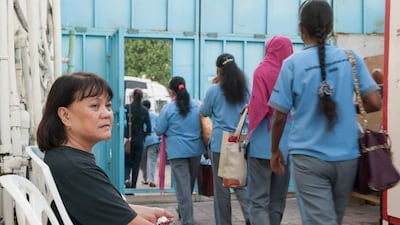At the crack of dawn, Mussaffah, the industrial suburb of Abu Dhabi, is already buzzing with life.
The day starts early here and the West Coast Ladies Camp, home to more than 150 female workers from African and South-east Asian countries, is no exception. The first bus carrying them to housekeeping jobs in hotels, shopping malls, schools and offices leaves for Abu Dhabi at 5.30am.
Making sure the departure goes smoothly is Theresa Culianan, a Filipina who has lived in the UAE for 27 years and has served as boss of the women’s camp since 2012.
Now 58, the slightly built Theresa moves energetically among the women from countries including Uganda, Kenya, the Philippines, Sri Lanka, India and Nepal, and range in age from 19 to those in their 50s.
She greets them with a drawn-out, singsong “Good morning”, checking that their uniforms are neat and clean before seeing them off and turning to the next group.
As the camp empties, Theresa surveys the premises to see if any-thing requires fixing or replacing.
“I am only happy if everything around me is clean and in order,” she says. “I am not a perfectionist. I just like improving things.”
Theresa shows off her most recent sewing project of bed linen and curtains, work she does to decorate the camp and encourage other women to take good care of their surroundings.
“I lead by example,” she says.
Born into a poor family of nine children, Theresa started working at the age of six.
“My parents were caring and loving, but poor. I didn’t have a happy childhood,” she says. “I didn’t touch a single toy or experience how to play.”
Her face darkens as those memories pour in, just as a Skype call from the Philippines quickly cheers her up. It is Theresa’s youngest granddaughter, who provides her Lola – grandmother in Tagalog – with a dance and a song.
Theresa’s dark brown eyes sparkle, and as she talks about her two sons and a daughter the mood is lifted.
“The biggest achievement was to send my three children to elementary school, high school and college, and to have built a house for my family,” she says. “I am proud of it.”
But her mission is not yet finished. Theresa’s daughter needs support in raising her children and Lola is there to help.
She still wishes she could have studied. She was passionate about history and social studies and dreamt of becoming a lawyer or a nurse. Instead, Theresa started a college course in commerce, but as she was the only one supporting her family it became too demanding.
Having heard of the UAE as one of the best countries to work in the Arabian Gulf, she headed for Abu Dhabi. The camp boss found the country as “peaceful and well organised” as she imagined. Only the abundance of greenery was a big surprise.
She started in a housekeeping role but her strong people skills and organisational ability were noticed by her employer. Soon she was asked to become the camp boss.
Her main duties are supervising accommodations, liaising with the company’s personnel department and overseeing workers’ time sheets. But Theresa’s greatest concern has always been the overall well-being of the residents.
“The girls are my responsibility and I treat them as my daughters. I am nice to them,” she says, pausing before winking and adding “most of the time”.
It is only natural for disagreements and misunderstandings to occur with so many women of different age groups and cultural backgrounds living together, but she tries to treat everyone fairly.
“I am here for the girls as their adviser, cleaner, nurse and most importantly, mother,” she says. “In times of emergency, loneliness, struggle, if you have faith, everything will be fine.”
But after almost three decades, she is ready to go home.
“I am planning to open a mini supermarket with an eatery,” she says. “It would provide an income and keep me busy, as I do not like sitting around.”
Above all, the biggest thing pulling Theresa back home – she hopes to leave by the middle of this year – is the desire to experience the family life she has missed so greatly. To make up for some of that lost time, she plans to live with her daughter.
“I would like to prepare my granddaughters’ food, uniforms, play with them and see them grow,” she says.
The women in the camp, many of whom regard her as a surrogate mother, will miss her when she leaves.
“Theresa is the same as my mother,” says Sripali, 33, from Sri Lanka. “I tell her all my problems and she helps me. She is concerned about others.”
Margarita Laput, 53, from the Philippines, says: “What Theresa does is a pure dedication and sacrifice. It will be difficult to fill her shoes when she leaves.”
Theresa cannot wait to get home but when she talks about leaving, her voice is tinged with sadness. “I will miss being here. Twenty-seven years is a long time, no? I will miss the country and I will miss the ladies.”
She pauses to reflect, but the moment of silence is broken by the women returning from work and rushing to the shared kitchen to cook their dinner.
Vaida Nairn, due to graduate next spring with an MA in photojournalism and documentary photography from the University of the Arts, London, is a volunteer for the Abu Dhabi informal volunteer network Feel Great Helping (facebook.com/FeelGreatHelping), which strives to empower women through cultural, social and self-development opportunities.

